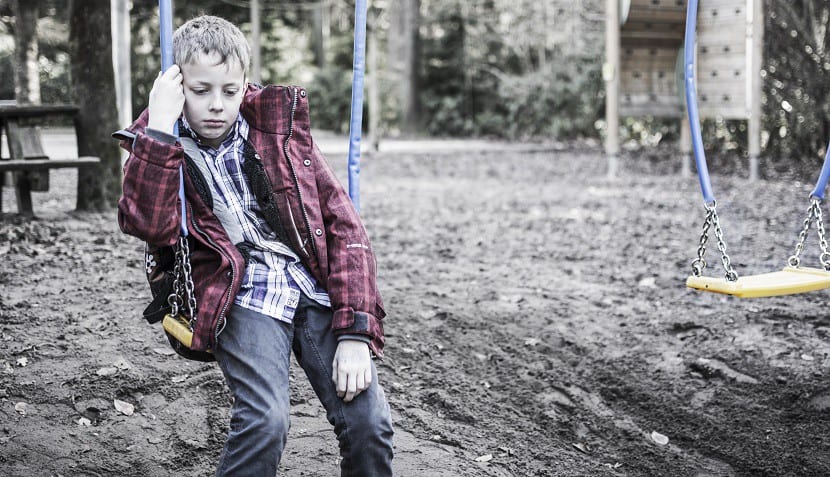
They say that time heals everything, but no. It is not like this. Time does not heal all wounds, it is more ... Time can cause emotional wounds to appear that were not healed at the time. Children show the most over time the strength of emotional wounds, as a childhood trauma can be triggered in aggressive behaviors and also, in mental disorders in the future.
There is a direct relationship between early psychological distress and aggressive behavior in people. Now, thanks to the team of researchers from the Swiss Federal Polytechnic School of Lausanne (EPFL) this gains even more force as they have been able to demonstrate this correlation. Psychological trauma in children creates lasting changes in the brain, changes that promote aggressiveness later in life.
Everyone knows that the brain has great plasticity, and these researchers think that thanks to that, perhaps with some specific treatments the negative consequences of this brain transformation could be reversed. But maybe, it would be better if as a society we realized the importance of children in our community and take care of them, so that they would not have to suffer the unbearable.
Violence in people
The first thing that comes to mind when a person is violent in his adult life is to wonder what his childhood must have been like to become such a cruel person ... That thought refers to the psychological traumas that can be suffered during childhood. Some of these people may also have alterations in the brain, something that most likely has to do with the fact that experiences have altered their behavior.

A team of researchers from the Federal Polytechnic School of Lausanne (EPFL), led by Professor Carmen Sandi, have been able to demonstrate the link between psychological trauma, brain changes and therefore also ... The relationship that all this has with the aggressive behavior of people.
The rats were the ones who helped in this experiment. A pre-adolescent rat that has a trauma will have aggressive behavior after having had some structural changes in the brain (the same observed in violent people). The emotional and psychological wounds suffered in childhood leave a persistent biological imprint on the brain. Children who suffer, in addition to suffering, also have brain alterations that will alter their behavior in the future, something that would not happen if they had not suffered those traumas or at least they had been treated appropriately to enhance their emotional well-being.
There are millions of children who are directly exposed to violence. The most common form of destructive aggression takes place in the home in the form of physical, psychological or domestic violence. The impact of these forms of violence on children and adolescents is complex, but what is clear is that it will turn them into violent and even dangerous people.
Severe stress also changes children's brains
Severe stress can also damage a child's brain, according to researchers at the Lucile Packard Children's Hospital and School of Medicine. The researchers found that children with post-traumatic stress disorder and high levels of the stress hormone cortisol were likely to experience a decrease in the size of the hippocampus, a brain structure important in processing memory and emotion.

Although similar effects have been seen in animal studies, this is the first time that the results have been replicated in children. The researchers focused on children in extreme situations to better understand how stress affects brain development. They do not refer to the stress of doing homework or arguing at home, but of post-traumatic stress, of psychological trauma. Children feel like they are stuck in the middle of a cul-de-sac and a truck is speeding towards them.
The children in the study suffered from PTSD as a result of being physically abused, emotional o sexual, witnessed violence or experiencing separation and lasting loss. This type of developmental trauma often affects a child's ability to reach social, emotional, and academic milestones. These children are at higher risk of developing depression or anxiety in adulthood.
Children who are genetically predisposed (or because of the environment in which they live) to be more anxious than their peers are also more likely to develop PTSD in response to emotional trauma, perhaps because their responses to other life experiences they were simply left with too high a stress threshold.
The researchers studied 15 children between the ages of 7 and 13 who suffered from post-traumatic stress disorder. Hippocampal volume was measured at the beginning and end of the 12-18 month study period. After correcting for gender and physiological maturity, they found that the children had more severe stress symptoms and had higher bedtime levels of cortisol (another marker of stress). They were more likely to have reductions in their hippocampal volumes at the start of the study than at the end of the study (compared to their less affected but equally traumatized peers).

Although daily levels of stress are necessary to stimulate normal brain development, excessive levels can be harmful and also have negative consequences on people's future behavior. A common treatment for PTSD is to help a patient develop a narrative of the traumatic experience. But if the stress of the event is affecting the areas of the brain responsible for processing information and incorporating it into the story, which treatment may not be as effective and alternatives should be considered.
As you have seen, it is very important to take into account children's well-being to guarantee their happiness and emotional stability in the future.